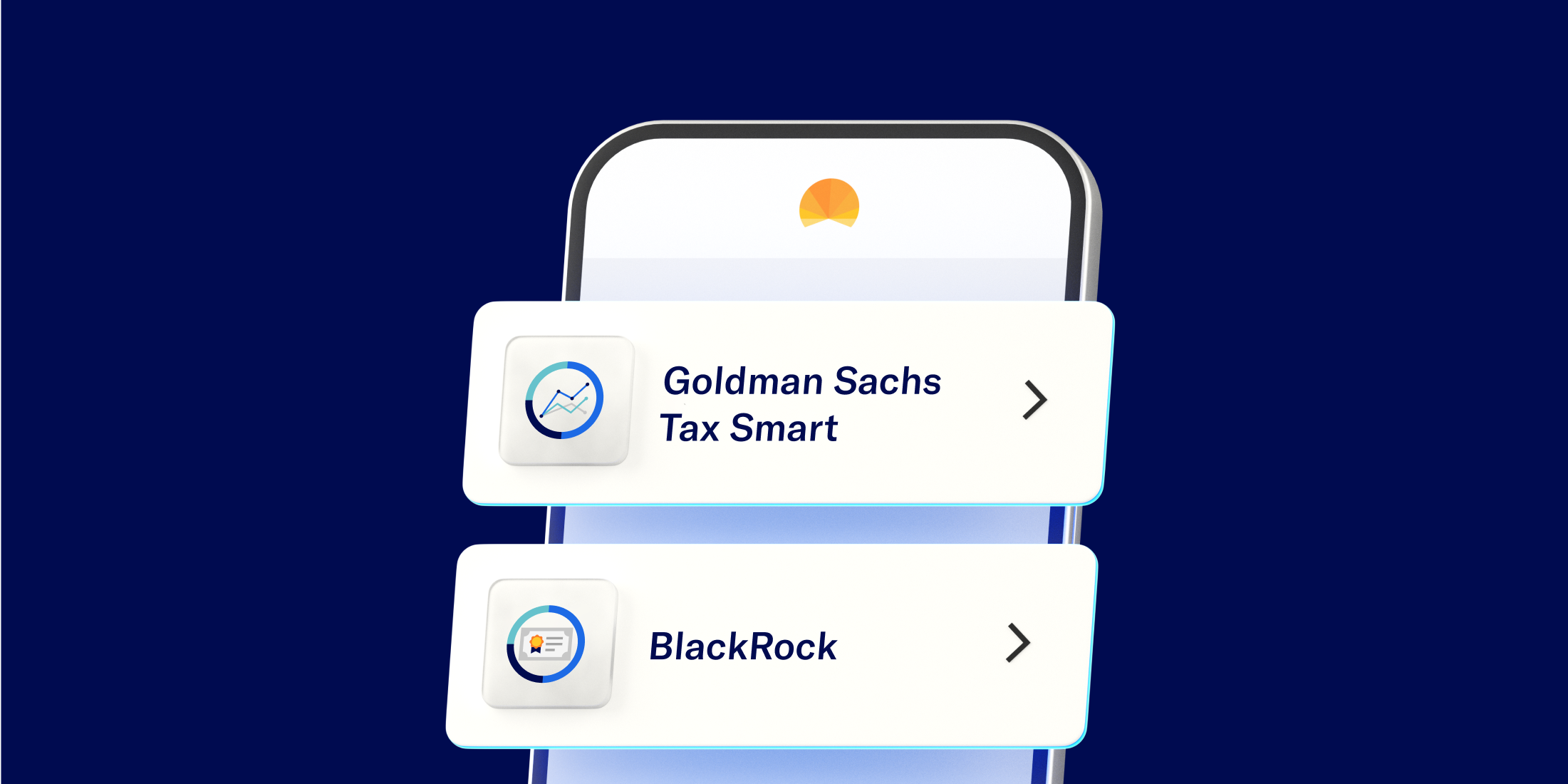Bonds

Featured articles
-
![]()
Make Your Money Hustle: Bond Investing
Explore how bonds can diversify your investments, filling the gap between cash and stocks.
Make Your Money Hustle: Bond Investing Explore how bonds can diversify your investments, filling the gap between cash and stocks. Bonds can be confusing, but we’re here to simplify them. Here’s the TL;DR: Bonds are loans you give to companies or governments who pay you back with interest. Bonds generally earn more return than high-yield savings accounts while taking on less risk than stocks. Bonds can be bought through several sources, including a broker, the U.S. government, or a diversified ETF like the multiple bond portfolios offered by Betterment. Congrats—you made it past the TL;DR. Next, we’ll dive deeper into how bonds may be able to bring balance to your investments, filling the gap between cash and stocks. In just a few minutes, you’ll walk away knowing: The basics of bonds The benefits of investing in bonds An easy way to buy bonds As interest rates begin to drop, bonds may be a good way to earn extra yield. The basics of bonds No need to read a book about bonds—here are three Q&As that give you the basics. Question 1: What is a bond? Answer: A bond is basically a loan that you provide to an entity such as a business or government that wants to raise money. You can buy and hold a bond directly from the issuer (e.g. buying US Treasury bonds from TreasuryDirect) or choose to buy and sell bonds on the secondary market (e.g. an online broker). Question 2: How does a bond work? Answer: After you “loan” your money to the entity issuing the bond, they agree to: Pay back your principal: The issuer promises to pay your initial money back, aka your principal, by a specified date called the bond’s maturity. Pay you interest: You’ll receive periodic interest payments based on the annual interest rate paid on a bond, called the coupon rate. These interest payments are either distributed to you or reinvested into your investment on a consistent schedule. Question 3: Are there risks to bond investing? Answer: Generally, bonds are less risky than stocks, but that doesn't mean they are without risk. Examples of these risks include: Credit risk: There’s a chance that a bond issuer won’t pay you back. Interest rate risk: There is a chance that the value of the bond will go down as interest rates go up. Long-term bonds have greater interest rate risk than short-term bonds. Most bonds are rated based on the bond issuer's financial strength and ability to pay a bond's principal and interest. Like stock investments, bonds with less risk offer less potential for return (aka lower yields). Less risky bonds include higher-quality bonds (more likely to be paid on time) or bonds with shorter maturities (length until full repayment). The benefits of investing in bonds For investors looking to put some of their cash to work but not wanting to go all-in on the stock market, here are three benefits that bonds can offer, making them complementary to cash and stock. 1) Bonds can help you avoid market volatility Unlike stocks, bonds don’t represent a share of ownership in a company. Because of this, you won’t see the value of a bond increase as much as a stock when a company grows, but you generally also won’t see it decrease as much as a stock when a company struggles. 2) Bonds can help you preserve wealth Bonds, especially short-maturity bonds, can be a good choice to help preserve your money while potentially earning more return than cash in a traditional savings account, money market account, or CD. 3) Bonds can help you generate income Because the entity issuing a bond typically pays the bondholder interest on some regular schedule, they can help generate consistent income with less risk than stock investing. An easy way to buy bonds Most bonds don't trade directly on centralized markets like stocks, making it more challenging to invest in individual bonds. You can buy individual bonds from a broker or directly from the US government, but both of those options require DIY knowledge and time to build a diversified portfolio. An easy way to invest in a diversified portfolio of bonds is to invest in a bond ETF. A bond ETF, or exchange-traded fund, trades on stock exchanges, like a stock ETF. In one purchase, a bond ETF offers investors a way to gain exposure to a diversified portfolio of bonds, which can include government, municipal, corporate, and international bonds. Bond ETFs aim to provide regular income through interest payments from the underlying bonds and offer the flexibility of buying and selling shares on an exchange throughout the trading day. Make your money hustle with a Betterment bond portfolio We’ve created two types of bond portfolios with different needs in mind: BlackRock Target Income portfolios What is it? The portfolios include a diverse set of bond ETFs with a range of risk levels, helping to mitigate exposure to volatility in the stock market, aiming to preserve wealth, while seeking to generate income. Who is it for? These portfolios may be better suited for investors looking for lower risk compared to stocks, with the option to choose one of four portfolio strategies targeting increasingly higher yields. The portfolio strategy should be selected based on your risk tolerance. Keep in mind, getting more income from a specific target portfolio also means taking on more risk. Goldman Sachs Tax-Smart Bonds portfolio What is it? This portfolio is built by Goldman Sachs using 100% short-term bond ETFs. Betterment then personalizes the portfolio based on your tax situation with the aim of generating after-tax yield. Who is it for? The portfolio is designed for higher-income individuals, especially in the 32% or greater federal tax bracket, looking for a potentially higher after-tax yield than a cash account with less risk than a traditional stock-and-bond investing portfolio. In both portfolios, all interest payments, also called dividends, are automatically reinvested to help grow the portfolio’s value. Ready to be invested? We make it simple to invest in a bond portfolio with three options: Make a one-time deposit. Set up recurring deposits from Betterment Checking or an external account. Schedule recurring transfers from your Betterment Cash Reserve account. Cash Reserve offered by Betterment LLC and requires a Betterment Securities brokerage account. Betterment is not a bank. FDIC insurance provided by Program Banks, subject to certain conditions. Learn more. -
![]()
How to course correct when you simply can't stay the course
De-risking during market volatility can be costly. Here’s how to do it without breaking the ...
How to course correct when you simply can't stay the course De-risking during market volatility can be costly. Here’s how to do it without breaking the bank. The best course of action during market volatility is often inaction. That’s because selling riskier assets at a loss locks in those losses. It foregoes their potential for future growth, and it might also trigger capital gains taxes in the process. But if taking some sort of action feels necessary, then modestly reducing your overall risk exposure can be a reasonable alternative. Consider dialing down your existing stock allocation by a few percentage points, or lower the costs of recalibrating by using your future deposits instead. Either way, the solution may be the same: sprinkling in more bonds. Consider bonds to calm your investing nerves When people talk about diversification, equities like international stocks get most of the attention. But no less important in the role of managing risk are bonds. These are the loans given to governments and companies by investors, and while they're not completely risk-free (no asset is), the relatively-modest interest they tend to pay out can feel like a windfall when stock values are plunging. They won’t negate all of the volatility of stocks, but they can help smooth things out and preserve capital. This is why all of our recommended allocations include holding at least some bonds. One way to de-risk some of your future investing is with one of our portfolios made up of both stocks and bonds (Core, Value Tilt, etc.). We’ll recommend a risk level based on your goal, but we make it easy to dial up the bond allocation to your preference. Over time, you can slowly finetune things until your collective risk feels right. Or you can let us automatically adjust it based on your target date. We also offer two portfolios comprised entirely of bonds, each one designed for a different use: The BlackRock Target Income portfolio, designed to help you limit market volatility, preserve wealth, and generate income. The Goldman Sachs Tax-Smart Bonds portfolio, designed for high-income individuals seeking a higher after-tax yield compared to a cash account. Don’t forget about the role of cash One of the best ways to mitigate your overall financial risk is by shoring up your emergency fund, which may include a high-yield cash account like our Cash Reserve. Imagine losing your income stream, and how much time you'd want to get back on your feet. A good place to start is 3-6 months' worth of your essential expenses, but your right amount is whatever helps you sleep more soundly at night. Cash Reserve offered by Betterment LLC and requires a Betterment Securities brokerage account. Betterment is not a bank. FDIC insurance provided by Program Banks, subject to certain conditions. Learn more. Steadying the ship during unsteady times As we mentioned up front, right-sizing your risk during downturns isn’t always cheap. But there are ways to minimize the costs. Lowering your risk profile incrementally is one of them, and stretching out your safety net is another. Either way, it’s okay to recalibrate your risk tolerance from time-to-time, and you can do it wisely with Betterment. -
![]()
A big bill, ballooning debt, and a weakening U.S. dollar
The “Big Beautiful Bill” could take our national debt to unseen levels. Will international ...
A big bill, ballooning debt, and a weakening U.S. dollar The “Big Beautiful Bill” could take our national debt to unseen levels. Will international markets reap the rewards? In early July, Congress passed the One Big Beautiful Bill Act (OBBBA), and while its full impact won’t be felt for some time, two key aspects of it seem at odds. The first is that it permanently extends certain provisions of the 2017 Tax Cuts and Jobs Act, including lower individual tax rates and higher standard deductions. The similar corporate and individual income boosting nature of the OBBBA has likely played some part in the rally in stocks since April. Yet as much as markets eat this type of legislation up, it comes with a strong risk of heartburn. That’s because the second major takeaway from the bill is that it’s forecasted to add around $4 trillion to the national debt over the next 10 years. The chart below shows the national debt as a share of U.S. GDP, and the dashed orange line shows the estimated trajectory after the passage of the OBBBA. It’s projected to grow to levels unlike anything we’ve seen before, including World War II. So what does all this mean for markets? Burgeoning debt means a larger supply of Treasury bonds that the Federal government uses to borrow. This may in turn cause interest rates to rise in the long term as bond investors with creeping doubts about our country’s fiscal situation demand a lower price and a higher yield for its debt. There are also estimates that the bill may be a drag on economic growth as bigger deficits and government borrowing start to crowd out private investment. We may not fully know the outcomes of tariffs and the OBBBA for some time, but one place we’re seeing policy changes already is in demand for the U.S. dollar. Since January, we've seen a significant weakening in the dollar relative to other major currencies as the trade war and fiscal outlook have shaken confidence in U.S. markets. The dollar is down almost 10% over the last six months, the largest decline in such a span in over 30 years. A weaker dollar has the effect of making imports in the U.S. more expensive for consumers, but it also makes international investments worth more, as the values of companies overseas have gone up in dollar terms just by virtue of their local currencies strengthening relative to the dollar. This currency dynamic has contributed to the strong returns of our globally-diversified portfolios in 2025. The first half of the year offers a case study in the benefits of being globally-diversified, which smooths out volatility as various parts of the world take turns outperforming each other. It may not make the news headlines any less scary, but it can benefit your investing’s bottom line. Cash Reserve offered by Betterment LLC and requires a Betterment Securities brokerage account. Betterment is not a bank. FDIC insurance provided by Program Banks, subject to certain conditions. Learn more.
Considering a major transfer? Get one-on-one help with one of our experts. Explore our licensed concierge
Looking for a specific topic?
- 401(k)s
- 529s
- Asset types
- Automation
- Benchmarks
- Bonds
- Budgeting
- Compound growth
- Costs
- Diversification
- Donating shares
- ETFs
- Education savings
- Emergency funds
- Financial advisors
- Financial goals
- Flexible portfolios
- Getting started investing
- Health Savings Accounts
- Home ownership
- IRAs
- Interest rates
- Investing accounts
- Market volatility
- Mutual funds
- Performance
- Portfolios
- Preparing to retire
- Retirement income
- Retirement planning
- Risk
- Rollovers and transfers
- Roth accounts
- Stocks
- Tax Coordination
- Tax loss harvesting
- Taxable accounts
- Taxes
No results found



